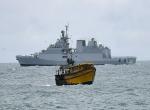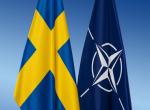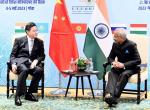Much has been made of the fact that leaders of all the permanent five member countries of the United Nations security council have visited India in 2010 in quick succession. This degree of bilateral attention to India within a short span of time may be unprecedented, but its significance should not be overstated. India’s international stature has no doubt grown in recent years, largely on account of its economic performance. The P5 visits do show a desire to engage more with a rising India, but over-interpreting the happy coincidence of the clustering of these visits in a single year as a sudden collective surge on the part of the great powers to acknowledge India’s global importance should be avoided. Nor should the timing of these visits be seen as a direct product of India’s enterprising diplomacy. In 2011, any visit by a P5 head of State or government to India should be ruled out as it will be our prime minister’s turn to make return visits, not necessarily to all these countries as diplomatic calendars have their own dynamics. But then, would the absence of such visits in 2011 imply a sudden loss of India’s global status as well as its diplomatic prowess?
Barring China, all visiting leaders gave us satisfaction in varying degrees on some issues of importance to us. On terrorism and its linkages with Pakistan, the United States of America, France, the United Kingdom and Russia have been chary of specifically naming Pakistan as a source of terrorist threat to India. The tendency has been to project Pakistan as a part of the solution rather than a part of the problem, make believe that it is on the right side of the debate as a victim of terrorism and to keep official silence on its terrorist affiliations in the Indian context.
Prime Minister David Cameron breached this inhibition by pointing to Pakistan’s double face toward terrorism. President Barack Obama disappointed by confining himself to known US positions in referring to terrorist safe havens in Afghanistan and calling for those responsible for the Mumbai attack to be brought to justice. The bolder statements came from the French and Russian presidents, with the former stating incisively that no one has imposed on Pakistan the choice to be “either a victim or a crucible of terrorism” and calling for the “perpetrators, authors and accomplices” of Mumbai to be brought to justice. The Russians have been, until now, unwilling to publicly chide Pakistan for its terrorist links, possibly because they want to keep their lines with Pakistan open, avoid raising the Cold War era concerns that Russia was taking sides in South Asia, and refrain from causing anxiety to the US by targeting a country critical for US operations in Afghanistan. President Dmitry Medvedev went a step ahead of the French president in stating that those who harboured terrorists on their soil were as guilty of terrorism as those who perpetrated such acts. He too called on Pakistan to comprehensively deal with those involved in the Mumbai carnage. No wonder Pakistan has called the relevant part of the India-Russia joint statement “unwarranted and unacceptable”.
The new willingness to be less squeamish about Pakistan’s terrorism links helps to corner it and squeeze its ability to manoeuvre, though the hardened Pakistani leadership has weathered more frontal charges of duplicity by US political and media circles by hunting with the Pentagon hounds and running with the Taliban hares. Premier Wen Jiabao, who in Delhi avoided expressing sympathy for the Mumbai victims that all other leaders made a point to do, felt no qualms about comforting Pakistan in Islamabad by lauding its role in combating terrorism, demonstrating again the cynicism of China’s foreign policy.
India’s candidature for permanent membership of the security council got a boost from these visits, the exception once again being China. President Obama’s endorsement, however weakly formulated and indeterminate in terms of time, was, in a sense, most significant as without US lead no reform of the security council can occur. France, which has been in the forefront of supporting India’s candidature, went further than ever when President Nicolas Sarkozy envisaged India’s membership in 2011 itself. Cameron too has backed India’s case unreservedly. Russia, the first P5 country to extend support, has been qualifying its endorsement, but President Medvedev made amends during his visit. Premier Wen resorted to the usual patronizing Chinese equivocation on the subject. All this support will remain at the rhetorical level for the time being, but India is right to press its candidature despite uncertainties ahead. In terms of its demographic and economic size, its human capital, its contribution to world civilization, its stakes in virtually all the challenges facing the international community, not to mention its stature in Asia vis-à-vis China, India must be represented in the one body, however imperfect, which has the mandate to ensure global peace and security.
President Obama took the lead in Delhi in endorsing India’s eventual membership of various non-proliferation and technology denial regimes such as the nuclear suppliers group, the missile technology control regime, Australia Group and Wassenaar Arrangement, as part of the welcome process to remove the anomalies that trouble India’s relations with restrictive cartels. Of this, the NSG is the most important as it governs global trade in nuclear materials. With the envisaged expansion of India’s nuclear power programme with foreign participation, it should be inside this group and participate in decision-making rather than merely comply with whatever is decided without its say. France and Russia too have extended support, and the UK can be counted upon to do so. Premier Wen, again, was silent on this subject, demonstrating China’s unwillingness to back a higher role for India in international power-broking.
On the civil nuclear liability issue, all three prospective participants in India’s nuclear power programme — the US, France and Russia — find their plans jeopardized because our legislation does not altogether exclude supplier liability in case of an accident. The US companies are most vocal in their opposition; President Sarkozy expressed reservations publicly and so did President Medvedev. All want the rules and regulations to be drafted under the legislation to define and limit supplier liability in amount and time as a via media. As a result, neither the French nor the Russians could sign, as they had initially hoped, commercial nuclear agreements during the presidential visits. The problem is legally complex and a neat solution may not be easily achievable.
The Chinese premier did nothing during his visit to allay the core of India’s concerns about China’s attitude and policies toward it. On the issue of stapled visas, the implied questioning of India’s sovereignty over Jammu and Kashmir and China’s growing presence in Pakistan occupied Kashmir, he came with no answers. Worse, on the boundary issue he conveyed the tough message that no complete resolution is possible in the foreseeable future, implicitly rendering hollow the mandate of the special representatives. China intends to maintain pressure on India as part of its larger strategy to increasingly penetrate the latter’s strategic neighbourhood to its disadvantage.
As India rises, the dynamic will be to build on the convergences with the US, France, the UK and Russia, and reduce divergences with China. As the totality of the P5 visits to India in 2010 show, the outlook on the first is positive, that on the second much less so.
-----------------------------------------------------------------
Article published in The Telegraph dated 7 January, 2010









Post new comment